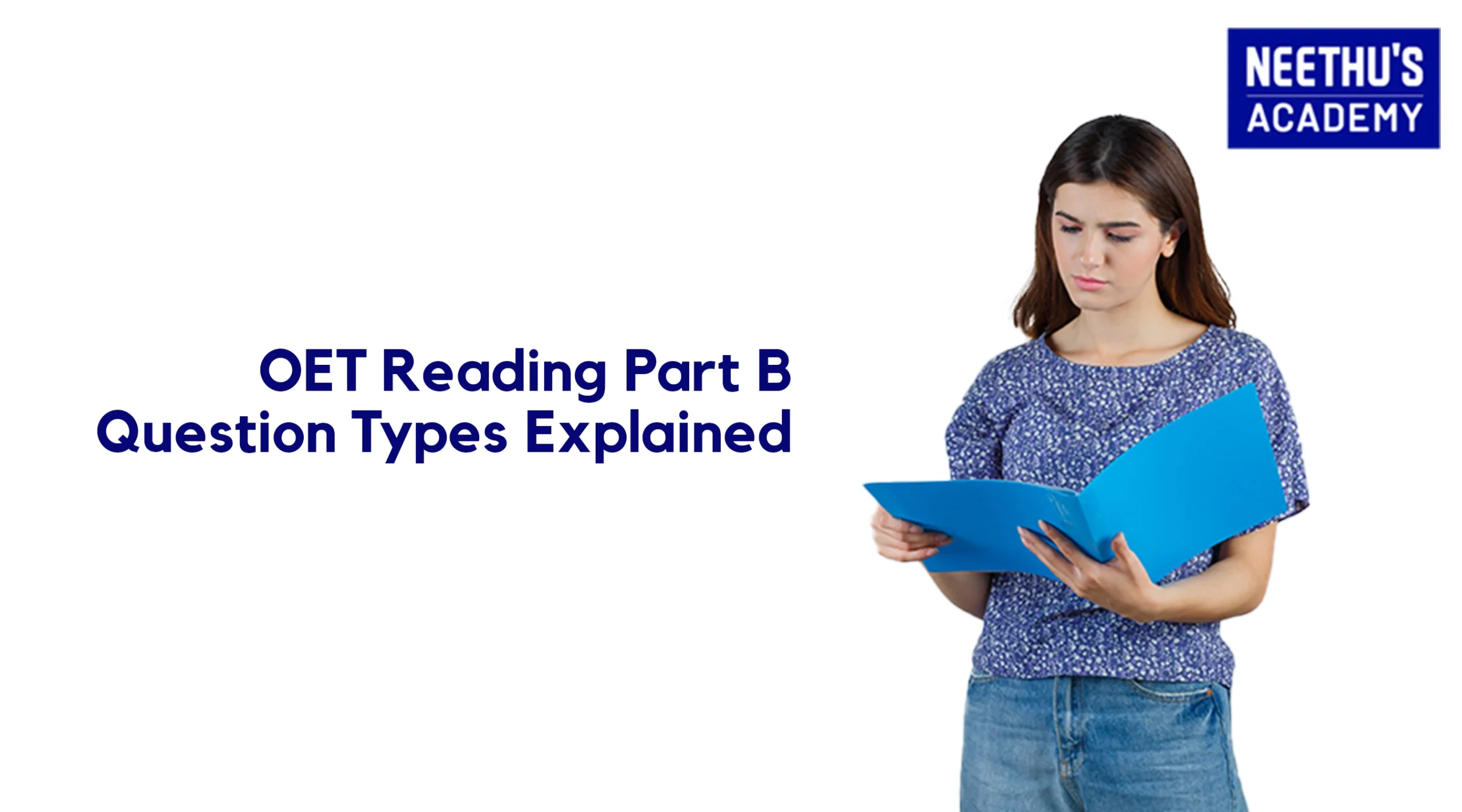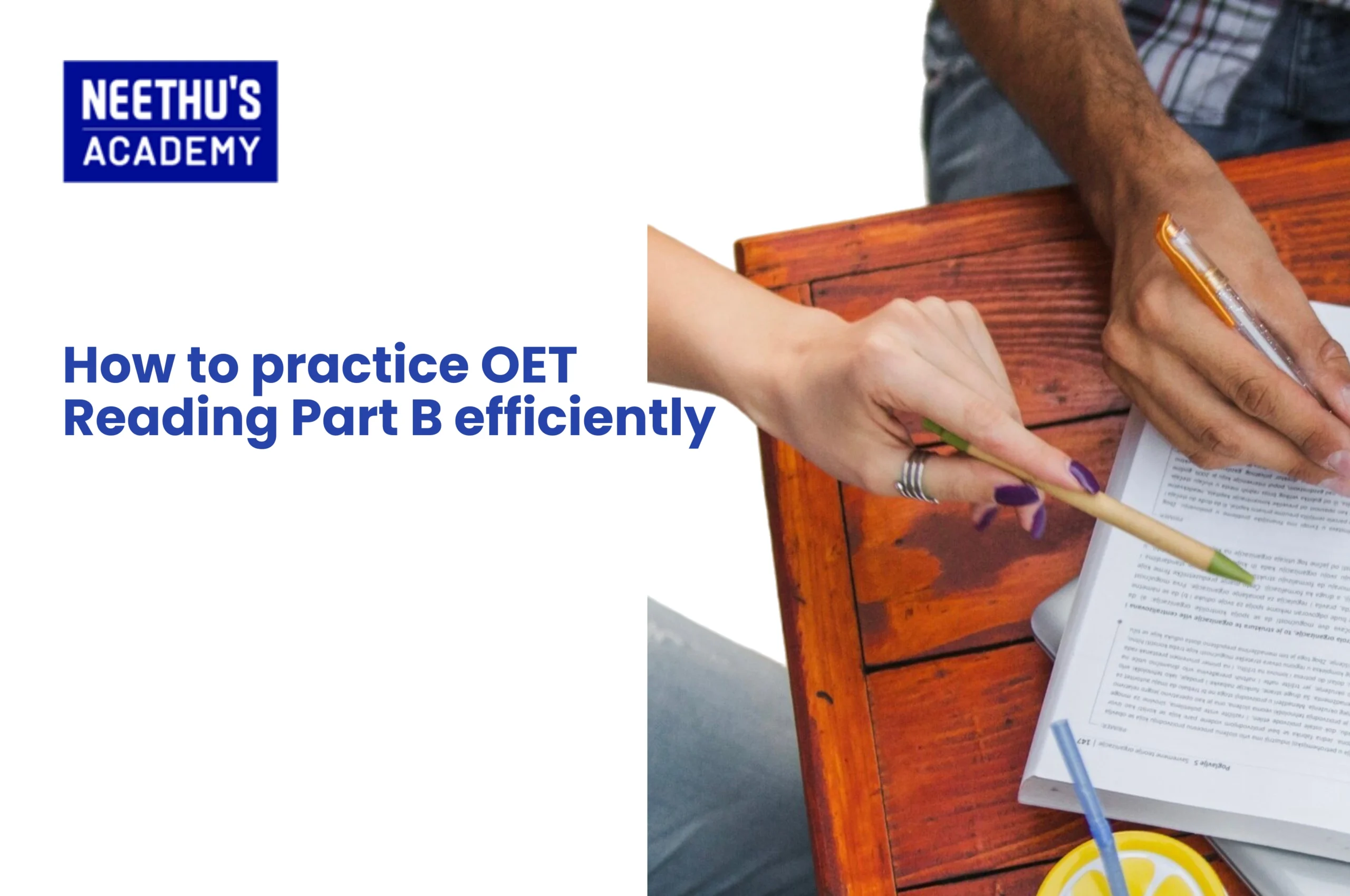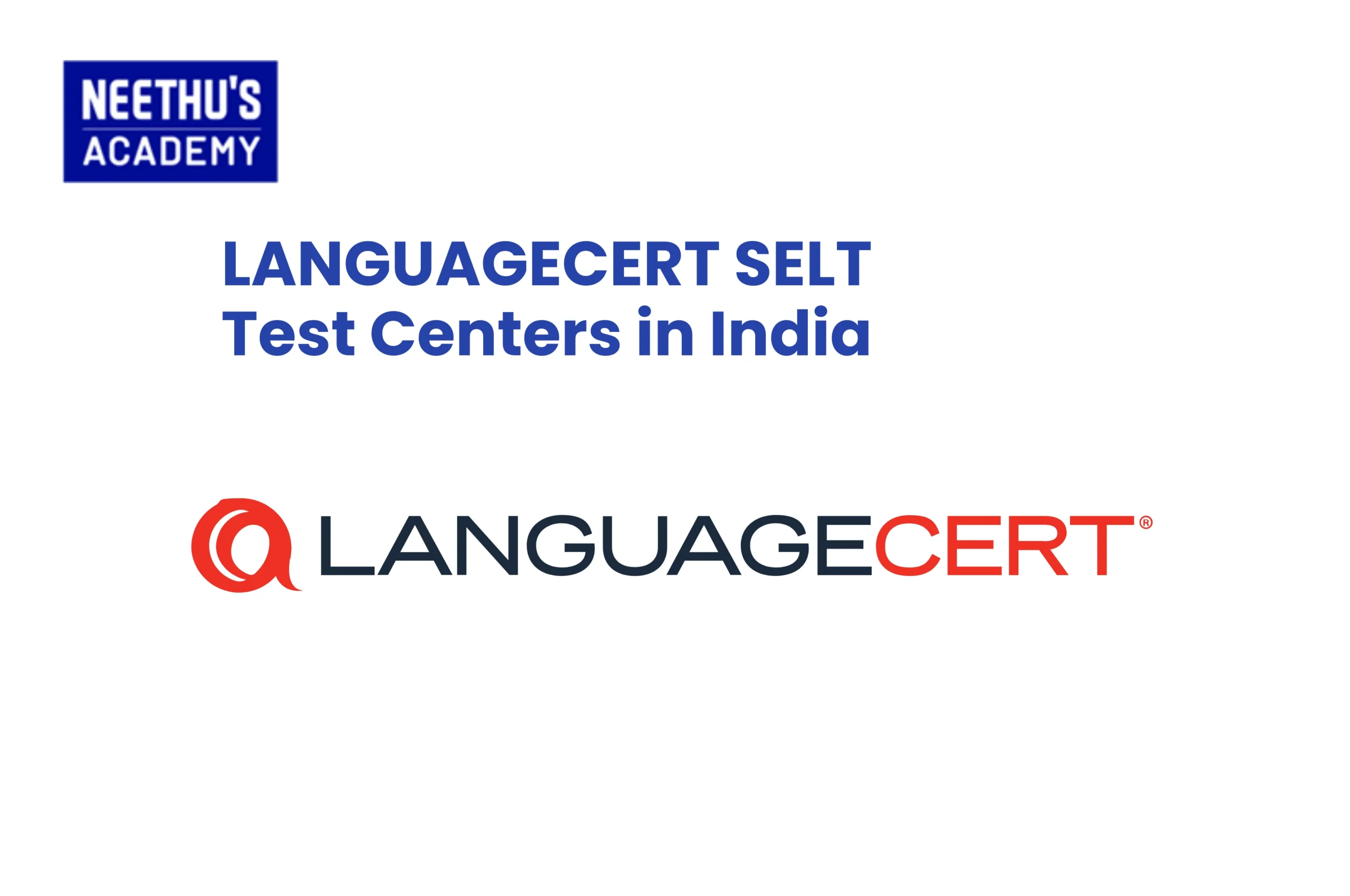
The OET Reading section assesses whether or not a candidate can comprehend and evaluate healthcare-related texts. This is why OET Reading Part…

Occupational English Test (OET) is an essential step for healthcare professionals intending to work or study in English-speaking countries. Of its components, OET Reading Part B is usually overlooked, even though it remains a frequent cause for candidates to not achieve their dream score. This part measures your skill to comprehend brief, job-related texts commonly faced in a healthcare setting.
But here’s the silver lining: With proper OET reading skills, regular practice, and proper coaching guidance, you can ace this section. This blog will walk you through the format of Part B, the approaches to crack it well, how to save time, and where to find the best assistance to enhance OET reading.
OET Reading Part B contains 6 independent short texts, which are each 100–150 words long. Following every text, a multiple-choice question consisting of three options is presented. You are to select the most suitable answer based on the information in the passage.
The texts are actual working materials that healthcare professionals would face in the workplace. Some of these might be:
Internal emails or memos
Hospital policies or guidelines
Staff notices or announcements
Instructions for use of equipment
Standard operating procedures
Senior staff advice or recommendations
Skills Assessed in OET Reading Part B:
Understanding gist – quickly grasping the general meaning
Scanning and skimming – finding specific information quickly
Inference – being able to understand the implied meaning or the writer’s attitude
Reading for detail – being able to identify similar-sounding but incorrect options
Critical reading – determining which answer captures the text’s intent
Mastering these skills in a timed environment is the key to success.
Your OET Reading Part B score can be improved through intelligent test strategies. The following tested methods have assisted many students in enhancing their performance.
Before reading the passage, read the question and options first. This provides context and helps your brain focus on relevant details while reading.
By recognizing the tone (e.g., formal, urgent, advisory) and purpose (inform, instruct, warn) you’ll get clues to the right answer. Pay close attention to modal verbs like must, should, can—they carry meaning.
Most of the time, one or two of the three choices will be obviously incorrect or only partly right. Strike them out quickly and concentrate on comparing the two remaining ones. This is more time-efficient and accurate.
OET usually has answer choices that are nearly right but just a bit off. Always support your choice with specific evidence from the passage.
You will not always have identical copies of the words in the question in the text. Be on the lookout for paraphrased sentences and synonyms. That’s where real OET reading skills come in.
Even if the text is familiar or “obvious,” don’t be dependent on intuition alone. Always refer back to the text and verify it before making a conclusion.
You have 45 minutes at your disposal for Part B and Part C of the OET Reading test. Proper time management is very important.
6 questions = 6–7 minutes in total
1 minute per question is the rule of gold
Don’t reread and second-guess too much
When stuck, note the question, proceed, and come back if time permits
By completing Part B in a hurry, you conserve time for Part C, which contains lengthy passages and tough questions.
1. Practice Under Timed Conditions
Practice OET Reading Part B always under timed conditions. This improves pressure management and boosts the speed of decision-making.
2. Go over Your Mistakes
Review more than just counting scores—review. Learn why you made the incorrect selection and what you were short on in the correct one. Keep a list of errors.
3. Paraphrasing Drills
Paraphrase a sentence without changing its meaning. This helps you to identify the paraphrased answers quickly.
4. Daily Medical English Exposure
Read newsletters related to health, workplace news, or NHS news. It acclimatizes you to the tone, style, and vocabulary adopted in Part B.
5. Flashcards of Regular Synonyms
Maintain a list of frequent health care synonyms (for example, “monitor” and “observe,” “commence” and “start”) to increase reading speed and understanding.
Enhancing OET reading requires quality resources and coaching support hand in hand. Most students face difficulty as they do not know how to practice optimally or discover their weak spots.
Recommended Resources:
Official OET Practice Books (answer keys and explanations)
Cambridge English OET Materials
OET Online Sub-Test Practice Tests
Health blogs and news from reputable websites such as the NHS or the WHO
Expert Coaching at Neethu’s Academy
At Neethu’s Academy, the best online OET coaching centre in Kerala, students are offered one-to-one help for every sub-test. At OET Reading Part B, our plan is:
Daily mock tests for Part B
Real-time doubt clearance
Explanation sessions by trainers
Error analysis workshops
Individual feedback on progress
Whether you study online or offline, guided learning and mentoring can help you overcome reading issues and reach your target score.
OET Reading Part B might look easy at first sight, but it is a test of accuracy, pace, and comprehension of professional healthcare English speech. With proper planning, efficient practice techniques, and appropriate guidance, achieving the highest scores and enhancing your Reading capability is quite feasible.
Start with analyzing your strengths and weaknesses, create a structured study plan, and take help from trusted resources. If you’re stuck in a loop of repeated attempts, consider reaching out to us, where professional guidance meets proven success strategies.
Practice every day with genuine test-type questions, pay special attention to keyword identification, and master how to effectively eliminate distractors.
Follow a structured plan, practice under time-constrained conditions, and get feedback from experienced OET tutors.
Take around 6–7 minutes in total, preferably one minute per question.
Practice strategic reading skills, build a vocabulary, check errors, and get professional tutoring for assisted improvement.

The OET Reading section assesses whether or not a candidate can comprehend and evaluate healthcare-related texts. This is why OET Reading Part…



WhatsApp us